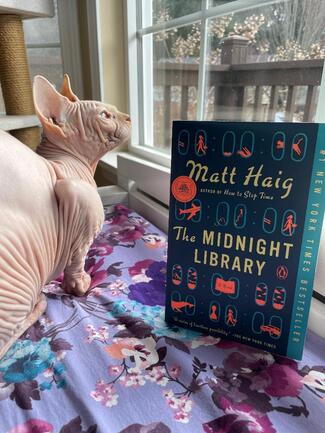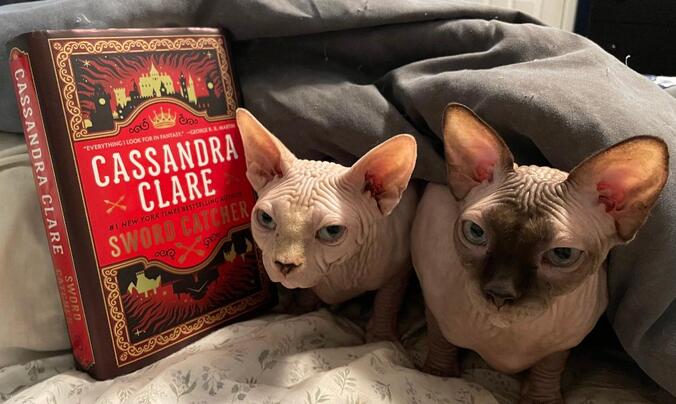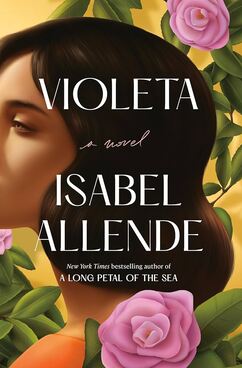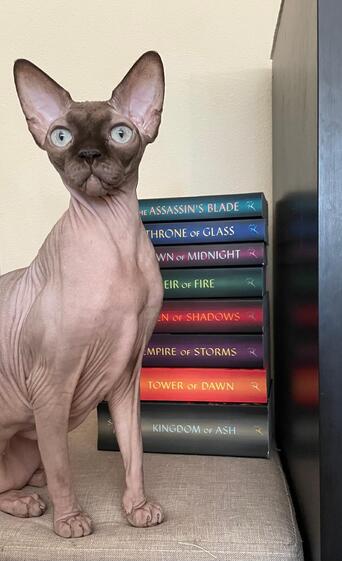|
Wilbur has no regrets, so he couldn't relate to the main character. Photo by Kate Ota 2024. The Midnight Library by Matt Haig has been brought up to me by several people: my mom, my sister, and one of my friends, who gave me the book as a gift. It seemed like the universe really wanted me to read it, so I finally did. This book was on many best seller lists and major book club lists as well as winning a Goodreads Choice Award for best fiction of 2020.
Content warning: a character commits suicide, a cat dies The Midnight Library follows Nora, a British 35 year old who has just been fired from her dead end job at a music store, whose cat has just died, and who basically is friendless and abandoned by her only remaining family. She ends up committing suicide and wakes in a sort of purgatory, a library. The librarian, her childhood librarian, explains the rules: every book in the library is a life she lived differently and she can ask to see any of them. Most are lives where she didn't do one of the regrets listed in her book of regrets, but some are just very small tweaks to reality. Nora explores these other lives to find one worth living, though many are not as happy as they seem. As time runs out and she moves closer to true death, she must decide what matters most to a life worth living. As many have said before, this book is very It's a Wonderful Life, but offering more alternate realities than could have fit into a movie. Though the final choice is predictable, it's interesting to see how many different versions of Nora's life the author was able to conjure. I found it interesting when she ran into other people in her situation, and that not everyone's midnight library was a library at all. It felt like a deep character study of Nora, which could be helpful to recreate if you as a writer are struggling with character. On the downside, Nora's cat at one point died of the same thing that killed my late cat, so that left me in tears for a while. I was also frustrated by how bad Nora was at fitting in to the lives she stepped into--she never got better at it! I guess improv isn't for everyone, but it's a useful life skill. This book is for you if you love It's a Wonderful Life, multiverses (but make it contemporary fiction), or if you yourself are struggling with regrets. This book is not for you if you are not in the headspace to read about suicide/suicidal ideation or dead cats (especially if a heart defect was involved), or if you're looking for more fantasy/sci-fi high-stakes multiverse hopping. Have you read The Midnight Library? Stealing this question from my mom, who asked her book club: what would your midnight library be? Let's discuss in the comments!
0 Comments
I woke them up for this picture so please excuse their grumpy expressions. Photo by Kate Ota 2024 Sword Catcher is the first adult fantasy from Cassandra Clare, of Shadowhunter fame. I enjoy that series from her because of how she can manipulate reader emotions about characters. She's also written the only love triangle that I consider a real triangle (Will/Jem/Tessa). Suffice to say, I think she's a master at character and was excited to see a new world from her.
Sword Catcher focuses on Kel, the titular sword catcher aka body double for Prince Conor. He steps in where there could be danger and his only job is to die for the prince, if necessary. With a little magic and a lot of coincidence, they look alike. When not on duty, Kel poses as the prince's cousin. Kel discovers a new crime lord has sprung up in the capital city who has eyes on taking down the prince (who is basically a regent due to his father's mental health) and Kel makes some unlikely friends in trying to protect the prince. One such unlikely connection is Lin, the only female physician from the local Ashkar people. Ashkar people are pretty much analogous to Jewish people at certain times in history--restricted movement, specific clothing requirements, no inter-marriage--and are the only people in the world who can use magic. Lin wishes only to save her bff/surrogate sister Mariam from a chronic illness that's about to run its course. But when Lin discovers a magical object that may be the key to saving Mariam, the problem becomes how to make it work, and why it seems to work only when she's called to the palace for some emergency healing. The world was very well-built. I understood what was going on, even when only shown a portion of the world. The characters' desires were clear and their actions always made sense in serving those wants. I liked the clear analogy to Jewish populations in the past with the Ashkar people and the LGBT+ friendly world. This kept it from feeling like just another fantasy Europe. There was a lot of diversity in characters from other places and thoughtfully developed languages. Unfortunately, there was so much worldbuilding that I started skimming over country names and character names if I didn't think they'd be relevant. Some names were also frustratingly similar, like Falconet and Fausten. The set up of the book also took too long, though I suspect this is because this book is clearly book 1 in a series, so the set up needed to set up the whole series and not just a stand alone. Still, it took a while for things to get moving. This book is for you if you like Cassandra Clare's characters and writing voice, if you want to read a book with fantasy-Jewish elements, and if you want to start a series with some serious worldbuilding. It's not for you if you want a book that can stand alone, if you need a fast pace from the start, or if you prefer low/urban/contemporary fantasy to high/epic/secondary-world fantasy. Have you read Sword Catcher? What did you think? Did you expect two characters to get together who haven't yet? (I did!) Let's discuss in the comments! Violeta by Isabel Allende was given to me for Christmas this year. I managed to squeeze it into January, making it my sixth read that month. I knew nothing about the book beforehand, so I went in with no expectations.
Violeta is an adult historical fiction following Violeta through her life from the 1920s onward in Chile. It included events American audiences would find familiar, like WWII, and less familiar, like the military coup in Chile. It was written as if it was a giant letter from Violeta to Camilo, whose relationship to Violeta becomes clear as the story progresses. I enjoyed learning about 20th century Chile from this book, because I knew very little about that. Something that surprised me was that despite the distance and different histories, a lot of familiar events acted like major milestones in Violeta’s life. I liked the different events that I'd not heard about before, because I worried initially that this book would be too similar to stories of 20th century Americans that I’ve read before. Something harder for me was the writing style. It had a lot more summary than scene, which matched the epistolary-like structure, but still didn’t work for me. It made the events feel too distant from me, and I had trouble understanding some of Violeta’s choices because I was so far removed from the moment. She also had awful taste in men. Warning: this book contains both physical and psychological abuse. This book is for you if you are looking for female-lead historical fiction, if you want to learn about 20th century Chile, or if you want fiction with the flavor of memoir. It’s not for you if you’re looking to read deeply about specific events or real people in Chile’s history, or if you’re not in the headspace to read about an abusive relationship, drug use, or pregnancy complications. Have you read Violeta? What about Isabel Allende’s other books? Let’s discuss in the comments! This series is almost as tall as my tallest cat. It's definitely a work out to haul this series around. Photo by Kate Ota 2024 Last year I reviewed Sarah J. Maas's hit Throne of Glass, the first in an adult epic fantasy series, and asked if it lived up to all the hype. I decided it was, and bought the rest of the series. In January, I finally finished the last book of the series, Kingdom of Ash, a nearly 1000 page behemoth. I even did the famous tandem read of Empire of Storms and Tower of Dawn. So, is all that worth the hype?
What's the series about? (SPOILER FREE) As a refresher, Throne of Glass followed Celaena Sardothien, famed assassin, as she tried to win the king's tournament to be the King's Champion, aka assassin on call. Along the way she got some troubling information from a ghost and discovered the king was not all he seemed to be. The rest of the series follows the same three characters: Prince Dorian, Captain Chaol Westfall, and Celaena Sardothien (by many names) through the adventures that ensue from seeds planted in book 1. More POVs are added over time for characters that have become beloved by fans. The books are: Assassin's Blade (prequel, recommended to read 3rd), Throne of Glass, Crown of Midnight, Heir of Fire, Queen of Shadows, Empire of Storms, Tower of Dawn, and Kingdom of Ash. Does It live up to the hype? My impression of the series was that it was a fun read. Celaena kept me on my toes and always guessing, and I loved whenever her plots and plans were revealed both to the audience and those around her. She was intensely clever not just powerful, and she never leaned to far into the trope I hate, "I'm not like other girls," because she was super girly when she had the chances. The romances were hit or miss for me because some I rooted for and sometimes I was yelling at the book about what a terrible guy someone was and why his romantic interest absolutely needed to dump him. My complaints are few. Even though I predicted a lot of the overall things that would happen, the twists along the way kept me going, just like in the first book. I didn't like Tower of Dawn much, because it focused on Chaol, who I grew to dislike. However, the tandem read improved that experience, see the next section. Does this series live up to the hype? Yes. Well written, interesting, surprising, strong female characters without the internalized misogyny, and a dash of romance. 10/10 will probably re-read someday! What's the tandem read and is that worth the struggle? The tandem read is when you read some chapters of Empire of Storms and then switch to Tower of Dawn, and then back again. I followed the guide on the Throne of Glass wiki, which I think worked well. Pros: You're not stuck with Chaol for 600 pages, you get others too. It feels more like the other books, where the main trio are all represented by POVs, even if they're not all together. You add tension to the read because if you follow the guide, certain elements align so you only know some information about the off-screen characters, but you maintain mystery. Cons: It takes a while to flag all the chapters before you start, and you may accidentally get spoiled by the first line of some chapters--especially in Tower of Dawn! I also somehow got off, and ended by reading two sections in a row of Tower of Dawn because I'd already finished Empire of Storms. Oops! And of course, if you read in public, you now have to carry around two books instead of one, and they're beefy. Overall, I felt like the tandem read was worth the struggle. I liked the added tension and the way it kept things fresh and moving forward. If you're curious about the experience, I recommend giving it a try! This series is for you if you like monarchy drama in fantasy worlds, a mix between hard and soft magic systems, a strong female main character, and fae/fairies. This series is not for you if you dislike fae/fairies, are not in the headspace for on-page violence or war (she's an assassin!), dislike soft magic systems, or dislike on-page sex scenes (they're not as descriptive as the scenes in Fourth Wing, but you're getting more than you'd get from a YA series, for example). Have you read the Throne of Glass series? Crescent City 3, also from SJM, just dropped so I may do another "does it live up to the hype?" post soon! Which of her series have you read, and which is your favorite? Let's discuss in the comments. |
Archives
April 2024
Categories
All
|





 RSS Feed
RSS Feed